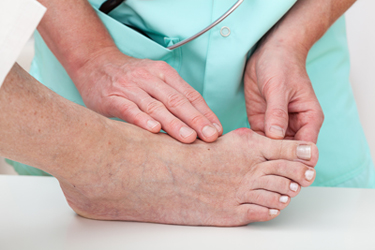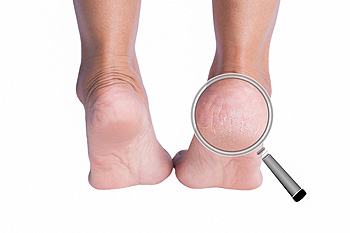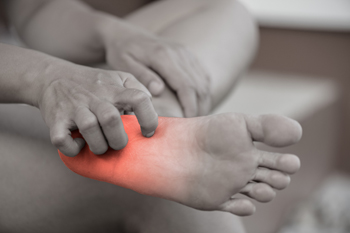Manalapan
(732) 845-0100
Manalapan (732) 845-0100

A bunion, termed hallux valgus, is a bone deformity of the big toe. This condition can cause the tip of the toe to push toward the smaller toes as the bottom of the toe joint juts outward from the foot. The resulting bump can prove to be painful as it changes the gait and rubs against the inside of the shoe. In some cases, a surgical procedure may be the only option for reducing pain. This may be successful in straightening out the joint, in addition to stabilizing the gait. It can also help to prevent hammertoe and other foot abnormalities from developing. Deciding on bunion surgery depends on various factors, such as the severity of the bunion, and whether it is related to osteoarthritis. Additionally, the impact it may have on completing daily activities or participating in sporting activities may contribute to making this decision. Side effects may include nerve damage, inflammation, and permanent stiffness. It is beneficial to explore this with a podiatrist before deciding on this type of surgery. To find out whether bunion surgery is the right option for you, it is suggested that you consult a podiatrist for an exam and diagnosis.
If you are suffering from bunion pain, contact Dr. Charles Marchese of Manalapan Foot & Ankle. Our doctor can provide the care you need to keep you pain-free and on your feet.
What Is a Bunion?
Bunions are painful bony bumps that usually develop on the inside of the foot at the joint of the big toe. As the deformity increases over time, it may become painful to walk and wear shoes. Women are more likely to exacerbate existing bunions since they often wear tight, narrow shoes that shift their toes together. Bunion pain can be relieved by wearing wider shoes with enough room for the toes.
Causes
Symptoms
In order to diagnose your bunion, your podiatrist may ask about your medical history, symptoms, and general health. Your doctor might also order an x-ray to take a closer look at your feet. Nonsurgical treatment options include orthotics, padding, icing, changes in footwear, and medication. If nonsurgical treatments don’t alleviate your bunion pain, surgery may be necessary.
If you have any questions, please feel free to contact our offices located in Manalapan, NJ, and Staten Island, NY . We offer the newest diagnostic and treatment technologies for all your foot care needs.

Children can get dry, cracked heels, and this can interfere with their active functioning. Cracked heels can occur in children for several reasons, including fungal infections, taking long and hot baths, obesity, and skin allergies. Drinking lots of water and good nutrition, which should include proper vitamins and nutrients, can help with dry, cracked heels in kids. Keeping feet clean, dry, and moisturized may also help prevent fungal and bacterial infections, such as athlete’s foot, often resulting in dry, cracked heels. Obese children can suffer from increased pressure on their feet, leading to cracked skin. If a child is obese, actions to bring a child’s weight into the normal range are suggested. Of course, if a child appears to get a skin reaction from a new product or some other irritant, it should be stopped immediately. Since dry, cracked heels have varied causes, it is suggested to take them to a podiatrist for an examination and treatment if this is something your child suffers from.
If the skin on your feet starts to crack, you may want to see a podiatrist to find treatment. If you have any concerns, contact Dr. Charles Marchese from Manalapan Foot & Ankle. Our doctor can provide the care you need to keep you pain-free and on your feet.
Cracked Heels
It is important to moisturize your cracked heels in order to prevent pain, bleeding, and infection. The reason cracked heels form is because the skin on the foot is too dry to support the immense pressure placed on them. When the foot expands, the dry skin on the foot begins to split.
Ways to Help Heal Them
Ways to Prevent Cracked Heels
If you are unsure how to proceed in treating cracked heels, seek guidance from a podiatrist. Your doctor will help you with any questions or information you may need.
If you have any questions, please feel free to contact our offices located in Manalapan, NJ, and Staten Island, NY . We offer the newest diagnostic and treatment technologies for all your foot care needs.

Neuropathy is nerve damage. It is a common condition among diabetic patients, which can happen as a result of elevated glucose levels in the blood. Recent studies have shown that about 60 percent of neuropathy cases in the United States are linked to diabetes. The feet are often affected, and the inability to feel existing cuts and scrapes may lead to developing a foot ulcer. The symptoms that often accompany this condition can include a numbing or tingling sensation, and the muscles can feel weak. Developing neuropathy may also be connected to chronic alcoholism, HIV, or AIDS, and there are cancer patients that may have this condition. A deficiency of vitamins B12 or A may cause neuropathy to occur, in addition to eating foods that have toxins. A diagnosis is generally needed to confirm this condition, which consists of having a blood test taken or possibly a skin biopsy performed. If you have numbness in your feet, it is suggested that you contact a podiatrist as quickly as possible who can properly diagnose and treat neuropathy.
Neuropathy
Neuropathy can be a potentially serious condition, especially if it is left undiagnosed. If you have any concerns that you may be experiencing nerve loss in your feet, consult with Dr. Charles Marchese from Manalapan Foot & Ankle. Our doctor will assess your condition and provide you with quality foot and ankle treatment for neuropathy.
What Is Neuropathy?
Neuropathy is a condition that leads to damage to the nerves in the body. Peripheral neuropathy, or neuropathy that affects your peripheral nervous system, usually occurs in the feet. Neuropathy can be triggered by a number of different causes. Such causes include diabetes, infections, cancers, disorders, and toxic substances.
Symptoms of Neuropathy Include:
Those with diabetes are at serious risk due to being unable to feel an ulcer on their feet. Diabetics usually also suffer from poor blood circulation. This can lead to the wound not healing, infections occurring, and the limb may have to be amputated.
Treatment
To treat neuropathy in the foot, podiatrists will first diagnose the cause of the neuropathy. Figuring out the underlying cause of the neuropathy will allow the podiatrist to prescribe the best treatment, whether it be caused by diabetes, toxic substance exposure, infection, etc. If the nerve has not died, then it’s possible that sensation may be able to return to the foot.
Pain medication may be issued for pain. Electrical nerve stimulation can be used to stimulate nerves. If the neuropathy is caused from pressure on the nerves, then surgery may be necessary.
If you have any questions, please feel free to contact our offices located in Manalapan, NJ, and Staten Island, NY . We offer the newest diagnostic and treatment technologies for all your foot care needs.

Toe pain can be the result of an injury. A broken toe can cause toe pain and may affect the skin, nerves, and blood vessels. Toe pain may also cause a burning sensation or it may feel numb. Ingrown toenails, bunions, and arthritis are leading causes of toe pain, and some of these conditions may lead to getting an infection if prompt medical attention is not received. Additionally, the foot condition known as hammertoe may cause toe pain which may happen from calluses that form on top of the deformed joints. Gout can be a debilitating foot condition characterized by intense pain in the joints of the big toe. Gout can occur due to excess uric acid in the blood, which converts to crystals and affects the big toe. If you have toe pain for any reason, it is suggested that you consult with a podiatrist who can pinpoint the cause and offer you the correct treatment solutions.
Toe pain can disrupt your daily activities. If you have any concerns, contact Dr. Charles Marchese of Manalapan Foot & Ankle. Our doctor can provide the care you need to keep you pain-free and on your feet.
What Causes Toe Pain?
Most severe toe pain is caused due to a sports injury, trauma from dropping something heavy on the toe, or bumping into something rigid. Other problems can develop over time for various reasons.
Toe pain can be caused by one or more ailments. The most common include:
When to See a Podiatrist
Diagnosis
In many cases the cause of toe pain is obvious, but in others, a podiatrist may want to use more advanced methods to determine the problem. These can range from simple visual inspections and sensation tests to X-rays and MRI scans. Prior medical history, family medical history, and any recent physical traumatic events will all be taken into consideration for a proper diagnosis.
Treatment
Treatments for toe pain and injuries vary and may include shoe inserts, padding, taping, medicines, injections, and in some cases, surgery. If you believe that you have broken a toe, please see a podiatrist as soon as possible.
If you have any questions please feel free to contact our offices located in Manalapan, NJ, and Staten Island, NY . We offer the newest diagnostic tools and technology to treat your foot and ankle needs.